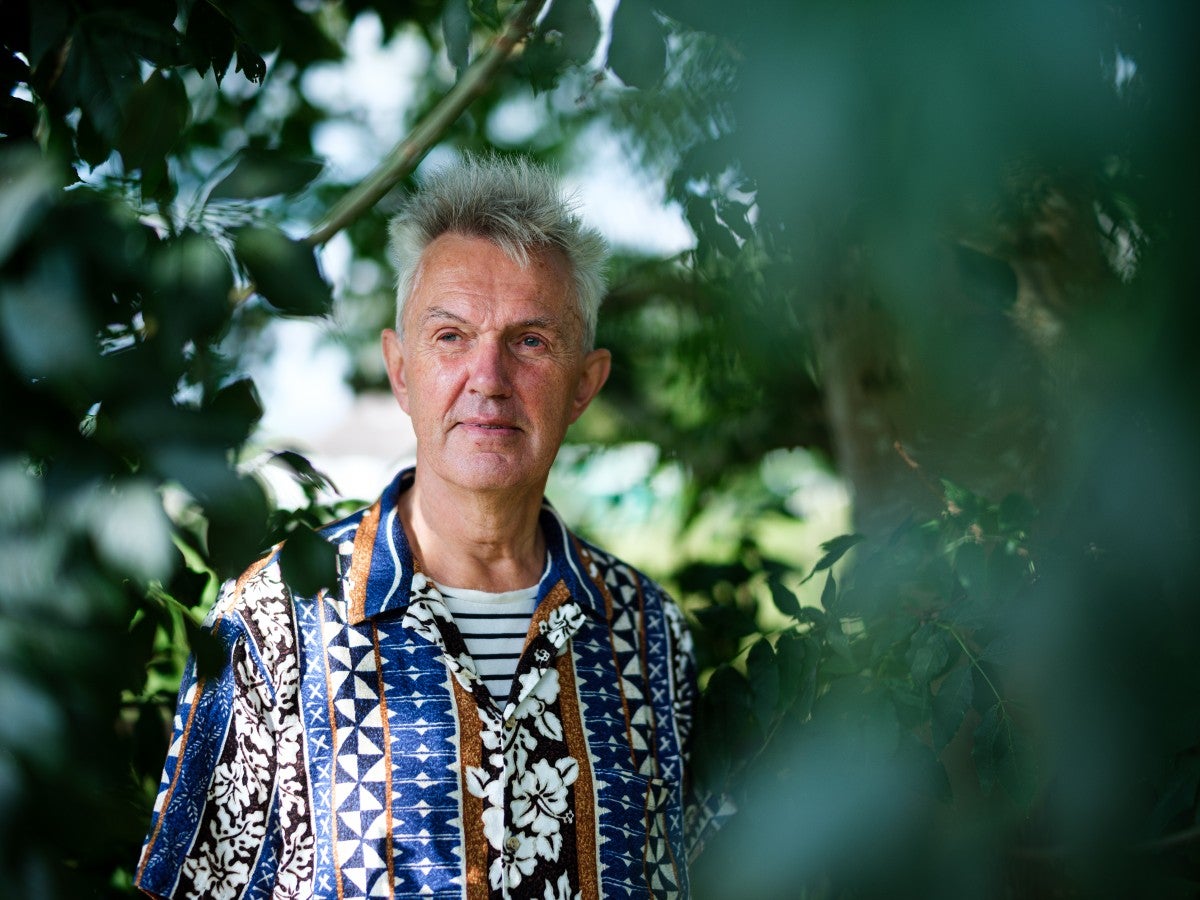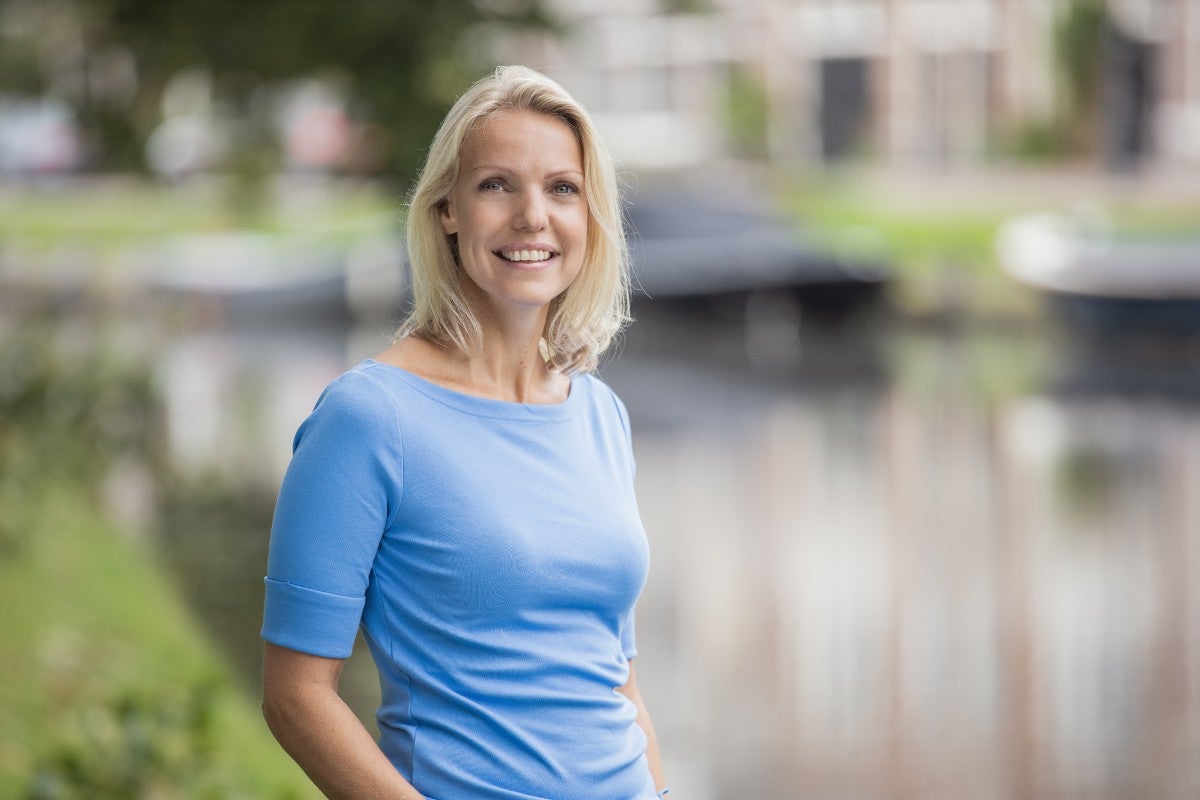During his biology studies at VU Amsterdam, writer Arjen Mulder lost his connection with nature. His fascination with trees grew, and he discovered a unique way to communicate with them. In his book Friendship with Trees, Mulder explores this journey to a deeper relationship with trees.
Mulder enjoys meeting in the botanical garden of VU Amsterdam. „I used to come here every week. It remains a lovely place.”
As an alternative meeting location, you suggested the Amsterdamse Bos. I wondered if that has to do with the joy of being in nature or if there’s a deeper connection for you.
„We’re sitting here amongst the trees, and trees are always very interested in what’s being said about them. So maybe I think and hope that when I’m among trees, I say more interesting things."
How do you interpret talking to trees yourself?
„I assume trees can perceive their surroundings. Not only in the sense that they know we’re sitting here, because of the pressure and their senses being attuned to it, but I also assume that these trees can, in a sense, follow what we’re discussing. They won’t be able to repeat it, but they understand that we’re talking about them. It’s not about the words; it’s about the emotional layer underneath."
You’re touching on an interesting topic here, as it quickly brings us to the concept of consciousness. Do you believe trees have consciousness?
„Trees are living beings. There is no different kind of life in trees than in us; we all have the same life on Earth, at the cellular or even subcellular level. That alone should allow for mutual understanding. Trees also have senses to perceive their surroundings. For instance, they have root networks and fungal connections underground, which allow them to “hear” where water flows. They can smell and taste; if there are toxic substances or heavy metals, they won’t grow toward them but rather away from them."
„Trees can also perceive light in three ways: they see not only whether it’s light or dark, but also where the light is coming from and how much red or blue light is present. In this way, they know not only what time of day it is but also what season they are in. They respond very appropriately to this information: they adjust the position of their leaves, grow roots toward water, or avoid undesirable substances. They are living beings with senses that respond fittingly to their environment."
But does a tree have consciousness, then?
„Yes, that’s the question. But if you look at human consciousness – many philosophical works have been written about it – no one can explain precisely what it is. We have senses, we perceive things, we respond, and we can express that through language. That gives us the illusion of consciousness. Animals have their own forms of language – think of the dialects of dolphins and whales, which have been extensively studied. Trees, of course, don’t have language as we know it, but they are completely different beings. Their “head” is actually underground, and above ground stand their “legs,” their branches, and leaves. It’s a completely different way of life."
Is that consciousness, then?
„I’d say yes, although I find it hard to imagine exactly how it works. Consciousness is not a list of properties; it is the ability to respond appropriately to the environment, to make decisions. Trees can’t walk away, but they do choose where to let their branches grow or how to turn toward the light. That’s not fixed in their genetics – a tree’s blueprint is more flexible. They make choices, but in a very different way from us because they grow instead of move."
How do you connect with a tree?
„At first, I had no idea how to do it, so I simply sat by a tree for a long time to see what would happen. I’d read somewhere that you could make contact with a tree, and I found it fascinating. What if you could really ask a question and get an answer? It’s about tuning in; you have to sense the atmosphere around the tree."
„Trees vary enormously from one another, and that’s something you gradually begin to understand. An oak has a totally different presence than a beech, and it’s something very different from a birch or wingnut. The first thing I discovered was that each tree species has its own atmosphere. After a while, you tune into it, and then something of an exchange begins. Although I still honestly don’t exactly understand what it is. Sometimes I hear a phrase, but they’re not grand, profound insights. They’re simple things that are useful to me at that moment."
But how can you be sure that it’s the tree speaking to you and not a deeper knowledge within yourself, something that might come from intuition, or God if you believe in that, or your own subconscious?
„Of course, you can never be completely sure. But for me, it feels different. The sentences I hear are things I’d never come up with myself; they come as a complete surprise. I ask a question, and the answer I get is something I’d never thought of before and that I haven’t read anywhere. Often, I even check if it could come from somewhere, but no – it feels truly like a phrase from outside myself."
„For example, I once asked an oak in Vondelpark what trees store in their wood during autumn as they prepare for winter: sugars, starch, chlorophyll? The tree responded: 'I store self-confidence in my wood.' That surprised me, a sentence that suddenly made me see the tree differently."
Before reading your book, I thought of The Lord of the Rings and those big, wise trees that come to life in it.
„I certainly think that the writer, Tolkien, spoke with trees. In England, it’s much more common to experience this connection with trees; there’s a large community of people who do so, with magazines and communities devoted to it. I myself took a tree journey through England visiting thousand-year-old yews and oaks. You can tell from those trees that they’re used to people talking to them; it goes quite smoothly – here in the Netherlands, making contact takes much longer, especially in a forest, because the trees have never encountered people who even show interest in their being."
I recently took a walk in the Veluwe and felt very calm and gained insights. How is your experience different from such a forest walk?
„The question is: what trees were there? You were in nature, but nature isn’t a general feeling; it always consists of concrete, living beings. It’s specific trees that do something specific to you. Of course, I don’t talk to every tree when I walk. Usually, I just walk, and sometimes I suddenly feel: this tree has something. I might feel the restlessness in my head fade away, or I gain more clarity. But sometimes there’s one specific tree that does more than just give a calm feeling. Sometimes I receive something practical from a tree, like: can you move that stone off my toe? And other times, it’s a simple greeting. You could also see it as the tree using your intuition to convey something."
Do you think it’s important for your experiences with trees to be scientifically proven?
„Not necessarily. Of course, I’m a biologist, so by nature and through my training, I tend to think, 'what is the explanation for this?' But at some point, I realised I don’t need an explanation for what I experience. Science is valuable – I’m not against science, absolutely not. But I see what I do as an extension of it, something that goes beyond what’s scientifically measurable. If you try to describe it in scientific terms, it all becomes hocus pocus. And yes, I understand that some fellow biologists may wonder which path I’ve taken. Or maybe they even think: is Arjen okay? But I can assure them: I’m doing very well."
I’ve also heard stories from people who, during or after psychedelic experiences, can talk to trees. What do you think of that?
„With people who have psychedelic tree experiences, I always wonder if they could have had them with a lamppost too. And do those conversations differ with a beech or an oak? To talk to trees, I need to be sober. And before I settle into nature – I live in the city – it often takes an hour before I’m in the right frame of mind."
Shouldn’t you live in nature?
„I’ve considered it, but I think I’d never write another word. I’d have so many interesting conversations with trees that I wouldn’t write anymore. When I’m deeply immersed in the green world, it also takes time before I can accept that people are as they are. I’d become a hermit."
I sensed in your book that you don’t look back entirely positively on your biology education. Is that correct?
„Yes, that’s right. The study was ideal for learning to observe nature – I spent endless hours drawing plants and observing everything meticulously. But later, more and more devices came between me and the subject of my research. The distance from nature grew larger and larger. The premise of science is often that we are above nature and that everything that lives should be collected and analysed as data."
„That distance, as if we’re not part of nature ourselves, I disagree with. That distance might be useful if you want to control nature, but if you want to preserve and treat it equally, you have to start from a different premise. From equality come respect, attention, and love naturally."
Did you feel at home at VU Amsterdam?
„Outside of my studies, I felt unhappy and often lonely. I had a few friends with whom I went to the cinema, but I grew up on the edge of Haarlem, and the transition to the big city was challenging. I also attended some philosophy and Dutch lectures, so I had people around me, but it all remained distant."
You have a Reformed background. Did that cause tension with your studies?
„Yes, absolutely. At home, the green collection boxes were always ready, so going to the VU was natural. But Reformed people were, especially in those days, not very social – you simply didn’t talk about many things. It was the same with the students. For some, biology was a way to lose their faith, and for many, it worked that way."
How did your faith fare during your studies?
„During the first years of my studies, I gradually lost my faith. It was also so peculiar during the course. Some professors opened lectures with a prayer and then continued with hardcore physics. In philosophy of science, we had to go through the entire philosophical tradition of the West: Kant, Descartes, and finally, we got to Dooyeweerd’s philosophy, which argued that everything was really done by God. Naturally, the whole lecture hall was in stitches."
Finally, what can we gain from talking to trees?
„It’s crucial, as things are going entirely wrong with the climate crisis at the moment. We need to start thinking differently about nature, and that’s one of the motivations behind my research. It begins with respect for nature and attention to each individual tree. This approach can lead to a different attitude and, I believe, to different knowledge. Instead of asking: how can we exploit nature and what’s in it for me?, we should ask: what does nature want us to do? In the hope of improving our relationship with nature in time."







